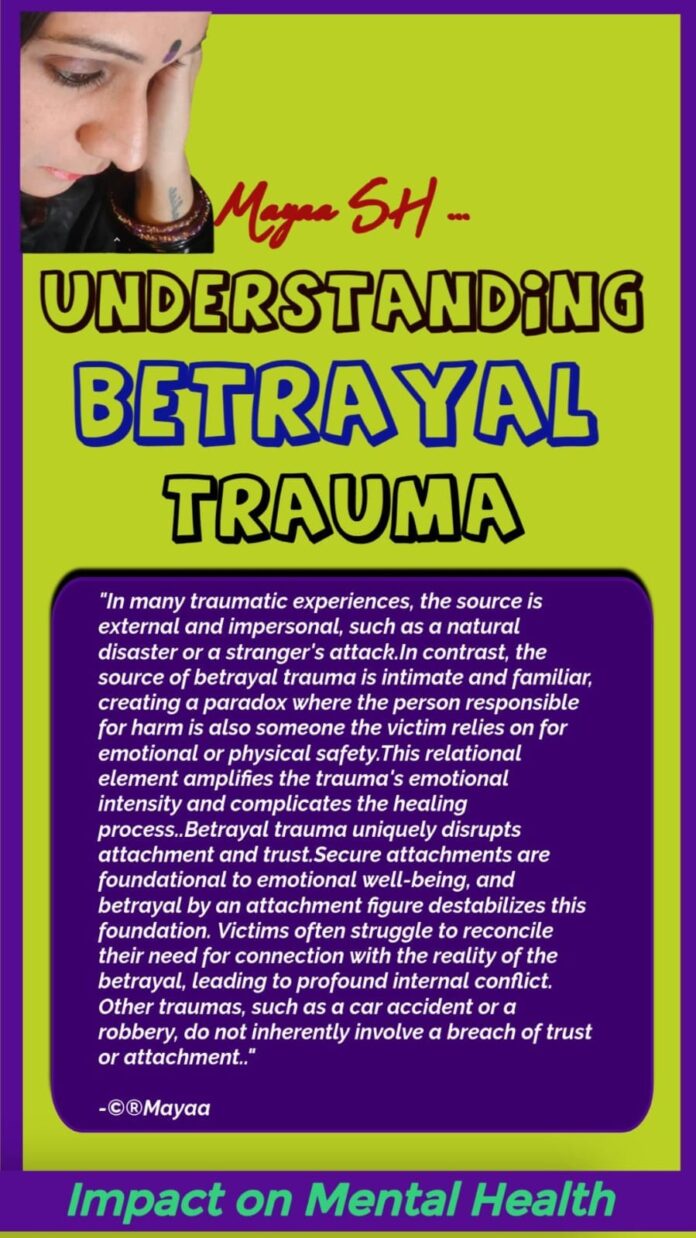Mayaa SH shares a cryptic letter from the lens of her journey of observations of Wives highlighting Betrayal Trauma and the Impact on Mental Health based on her Observations and Insights …
Mayaa SH’s fame in women’s empowerment stems from her multifaceted contributions as an author, activist, and public intellectual. Her work consistently champions gender equality, challenges societal norms, and advocates for women’s rights across various platforms. Mayaa SH is recognized as a “Championer of Women’s Rights” and a “Literary Empowerment Campaigner.” She actively works to promote women’s rights and gender equality, addressing issues such as gender inequality, violence against women, and lack of economic opportunities. She is also an avid campaigner of the one who has shattered glass ceilings and barriers to champion the cause of Gender Equality and Neutrality. Mayaa SH’s writings serve as a powerful tool for women’s empowerment. She is a multi-national award winner, a world record holder, and has authored numerous books and co-authored many anthologies. Her works often reflect contemporary issues, providing a platform for marginalized voices and challenging societal norms. She uses her writing to speak truth to patriarchy and provide support to those who are most battered.
Betrayal trauma occurs when a person’s trust is violated by someone or an institution they depend on for support, safety, or well-being. This violation can stem from various sources, including partners, family members, caregivers, or institutions like workplaces or healthcare systems. The core of betrayal trauma lies in the reliance on the betrayer, making it difficult for the victim to simply remove themselves from the situation.
Betrayal trauma can significantly impact mental health, leading to a range of psychological and emotional challenges. These effects can manifest in several ways:
Specific Examples of Mental Health Impacts:
Emotional Distress: Individuals may experience a wide range of intense emotions, including anger, sadness, confusion, fear, shame, and grief. These feelings can fluctuate rapidly, making it difficult to find emotional stability.
Anxiety and Depression: Betrayal trauma can trigger symptoms of anxiety and depression, making it difficult to cope with daily life.
Post-Traumatic Stress Disorder (PTSD): The experience can lead to symptoms of PTSD, such as intrusive thoughts, nightmares, hypervigilance, and flashbacks.
Trust Issues: Betrayal can erode trust, making it difficult to form and maintain healthy relationships in the future. This can lead to isolation and loneliness.
Altered Self-Perception: Betrayal can damage self-esteem, leading to feelings of shame, guilt, and self-blame. Individuals may question their judgment and feel unworthy of positive relationships.
Dissociation: As a coping mechanism, individuals may dissociate or detach from their emotions and thoughts to cope with the trauma.
Cognitive Difficulties: Betrayal trauma can affect concentration, decision-making, and memory.
Physical Symptoms: The emotional distress can manifest physically, leading to headaches, fatigue, sleep disturbances, and digestive issues.
Increased Risk of Mental Health Disorders: Betrayal trauma can increase the risk of developing diagnosable mental health disorders.
Betrayal Blindness: This is a defense mechanism where individuals may unconsciously ignore or downplay signs of betrayal to maintain the relationship, particularly when dependent on the betrayer.
The Role of Attachment:
Partner Betrayal Trauma: This can lead to difficulty trusting in other relationships, an altered definition of love, re-victimization, and lowered self-esteem.
Childhood Betrayal: This can lead to the development of protective emotional traits that make it harder to form close bonds with others.
Institutional Betrayal: This can lead to mistrust of helpful institutions, such as the healthcare system.
The Brain’s Response:
Attachment styles developed in early childhood can influence how individuals experience and respond to betrayal trauma. Those with anxious attachment styles may try to mend conflicts and avoid rejection, while those with disorganized attachment styles may have difficulty trusting others.
Recovery and Treatment:
Betrayal trauma can lead to significant changes in the brain. The amygdala, responsible for processing emotions, can become hyperactive, increasing anxiety and alertness. The hippocampus, involved in memory processing, may struggle due to stress hormones. The prefrontal cortex, which is involved in decision-making and concentration, may show reduced function.
Healing from betrayal trauma involves acknowledging the trauma, processing emotions, seeking support, and developing coping strategies. Therapy, particularly trauma-informed therapy, can be beneficial.
Cognitive Behavioral Therapy (CBT): This can help individuals identify and change negative thought patterns and behaviors.
Eye Movement Desensitization and Reprocessing (EMDR): This therapy can help process traumatic memories.
Trauma-Focused CBT: This can be particularly helpful for those who have experienced childhood trauma.
Mindfulness-Based Techniques: These can improve emotional regulation.
Somatic Experiencing and Sensorimotor Psychotherapy: These approaches can help individuals reconnect with their bodies and process emotions.
The effects of betrayal trauma can be long-lasting, and recovery is a process that requires time, patience, and professional support.
“In many traumatic experiences, the source is external and impersonal, such as a natural disaster or a stranger’s attack. In contrast, the source of betrayal trauma is intimate and familiar, creating a paradox where the person responsible for harm is also someone the victim relies on for emotional or physical safety. This relational element amplifies the trauma’s emotional intensity and complicates the healing process. Betrayal trauma uniquely disrupts attachment and trust. Secure attachments are foundational to emotional well-being, and betrayal by an attachment figure destabilizes this foundation. Victims often struggle to reconcile their need for connection with the reality of the betrayal, leading to profound internal conflict. Other traumas, such as a car accident or a robbery, do not inherently involve a breach of trust or attachment…”
Mayaa SH Inks from the author’s spectrum a cryptic letter from the lens of observations of wives and cases highlighting Betrayal Trauma and Impact on Mental Health based on her Observations and Insights Of Many..
Dear Husband,
I write this to you on a pensive note after going through a lot due to many girls associated with you. I’ve reached the end of my ability to continue explaining to you that I need time and to be listened to. I’ve spent a lot of time reflecting on what went wrong. I’ve realized that I’m deeply traumatised by the events of last year, and I deserve to be happy including you. I’ve also realized that you deserve to be happy, and I’m no longer the person who can make you happy as it has been a month I used to receive texts from you\_ that were deeply seated on how much you loved me.
One of the biggest issues has been the lack of communication and the feeling of being unheard. I’ve tried to express my needs and feelings, but it often felt like my words weren’t registering. I felt ignored and unappreciated. I felt like I was “a nothing,” not a person, and that I was just a doll in your life meant to just satisfy the requirements of the day.
I’ve also felt a deep sense of loneliness. I’ve felt alone in the relationship, even when we were together as your time was consumed in everything. I am not angry. I’ve felt like I was carrying the weight of everything, and that my efforts weren’t acknowledged or reciprocated and were not enough either for your community or you as other girls in the end got credits or priorities. I’ve felt like I was the only one trying to make things work.
I’ve come to realize that we have got stoned as such cheap things were spoken about me and you still continued to give credit to those who did everything possible that we should not have been together. You no longer share common interests or goals. You live a separate life, and the distance between us has become too great to bridge.
Every time I call or text you started making excuses, you had to take refuge while you had other tasks to handle. I would have appreciated if you would have told me upfront that you are fine and dusted rather than burdening yourself daily with giving to either two. The pattern that was seen in June makes me believe that there is someone in your life but you are scared to talk about it. I’m truly sorry for making you a part of what all I went through in separation between April till November last year. I considered you my friend first and tried my level best to talk about the trauma that got induced between both of us and that you don’t wish to harm me. I don’t hate you. I just can’t continue to allow myself to get hurt because of others who tend to get your time or priority. I hope that someday you will try to understand me and give that peace and happiness, even if it’s not together as per you.
I know you have found a replacement and that is the reason you neither call nor text. I have a tremendous amount of anger and hurt and resentment for what those girls associated with you did last year and I know it has negatively impacted almost every interaction that we have/had. I truly believe that a lot of those feelings have been generated by something that is beyond my control. But I don’t know how not to take it personally, nor do I know that I’d ever be able to learn how to. Maybe I’m just not the person you were looking for or you wish to get married to.
I know you hate me the most and that hatred you have publicly shown while announcing your big event in just two days from now. I don’t know you made up your mind in June to leave and to lend itself to any of that, but I am pretty sure that “being pleasant” is never, ever going to provide or contribute to any of those things that you have been trying to communicate to me since your birthday. I guess I don’t believe that you “hate” me. I guess I think what you “feel” toward me is just plain old apathy. I know you have found someone. Maybe all of the negative feelings and emotions I’ve been carrying around and contending with really have made me into the terrible person you’d have me believe I am. But even if that’s true, I think – think – that I should have at least a little bit more than this. And though I don’t FEEL like I am, according to you, “the meanest person you’ve ever met”, obviously, I must be. To you. And you deserve more than this. Thank you for expressing yourself via your announcement of your event. I know what my place in your life was? Why will anybody keep me out of events groups, if you had any issues I would have appreciated if you would have spoken about it to me straightforward. Why would you say that you love me and then project me like this in front of the world with no status giving impetus to someone who along with others two created a ruckus, that all know.
-Your Beloved Wife
(The Letter Is An Adaption/Narrative Created By The Author For Understanding Realistic Scenarios Of Betrayal Trauma)
Mayaa SH’s approach to women’s empowerment is holistic, addressing various aspects of women’s lives, including education, healthcare, economic opportunities, and political representation. She believes that investment in women’s education and health boosts economic development. Mayaa SH’s fame in women’s empowerment is a result of her consistent efforts to advocate for women’s rights, challenge societal norms, and empower women through her writings, activism, and public speaking. Her work resonates with a wide audience, inspiring change and contributing to a more equitable society.





















